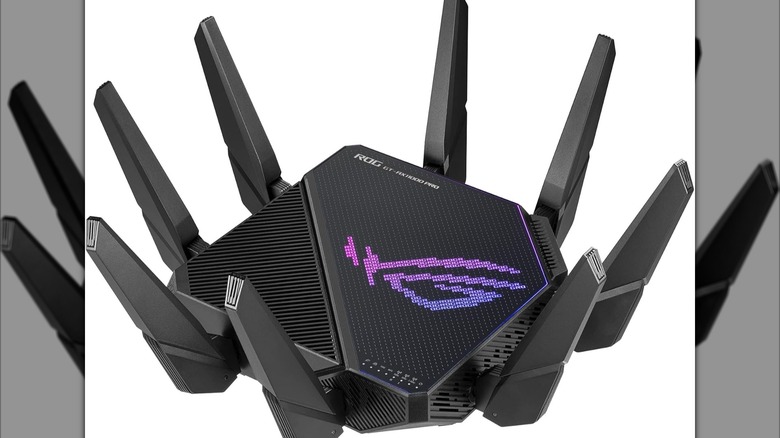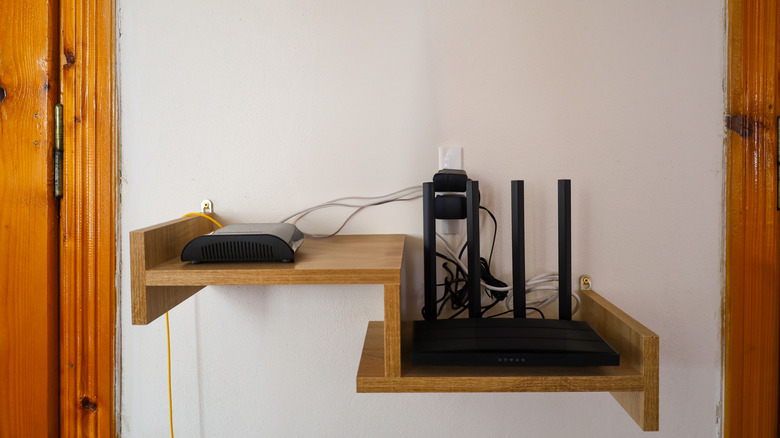Can A Gaming Router Replace Your Typical Wi-Fi Router? Here's How They Differ
We may receive a commission on purchases made from links.
One of the most high-impact activities you can get up to with an internet connection is online gaming. Competitive gaming necessitates snap reflexes from not just you, the player, but the device you're playing on. Not only does your PC need to have the necessary internal components to run and render the game, but the internet router you're connected to needs to be tough enough to withstand the high degree of net traffic you're subjecting it to. It's from this need for beefy routers that a subset of the sector has arisen in the form of gaming routers, which are loaded with various specialized features to optimize internet traffic while minimizing data loss and input lag during competitive gaming.
Given the impressive efficacy with which a gaming router can connect you to the internet, it wouldn't be unreasonable to consider them some of the highest-quality routers out there in general. If your current internet router isn't quite doing it for you, a gaming router would almost definitely be a substantial step up in performance. The question is, however, whether or not that substantial improvement is really necessary for your typical online activities, especially if you're not personally engaging in online gaming.
Gaming routers are optimized for gaming traffic
To properly accommodate intensive, competitive online gameplay, a gaming router is designed to get you connected to the internet as quickly as possible and ensure your connection stays sturdy and streamlined. At the baseline, this means utilizing the latest and most advanced connectivity features, such as Wi-Fi 6 and tri-band connectivity. These features can get you baseline connection speeds of around 6600 Mbps, more than enough speed to render even the highest-quality video in a split second.
It's not just about baseline speed, however; gaming routers are also equipped with features that optimize and prioritize your personal net traffic while engaged in bandwidth-hungry activities like online gaming. For example, a gaming router may have Quality of Service features, or "QoS," which automatically prioritizes internet traffic received from gaming apps over other apps on your PC. Gaming routers can also reserve and allocate bandwidth, effectively setting aside a chunk of your available net traffic exclusively for the use of gaming apps and preventing any other apps from hogging it. For those connecting using Wi-Fi specifically, as opposed to a hard Ethernet connection, a gaming router may use beamforming, which broadcasts the Wi-Fi signal directly at your PC instead of having it bounce all over the room. Two especially useful features for playing games with servers around the world are ping heatmaps and geofencing, which allow you to prioritize connection to servers with lower ping, then cordon off those servers to ensure your consistent, repeated connection.
A gaming router could replace a normal one, but it might be a bit excessive
Gaming routers are crammed full of features designed to give you the highest possible internet performance conceivable, all for the purpose of keeping your connection fast and secure while you're engaged in high-impact gaming. Gaming routers are also, however, prohibitively expensive. ASUS's ROG gaming router, for example, will run you $329.99 on Amazon, as opposed to one of its RT-AX1800S routers, which costs just $89.95 on Amazon.
Gaming routers are top-of-the-line, there's no doubt about that, but before you run off to buy one, you should consider whether or not you actually need a top-of-the-line router. For one thing, if you're not actually engaged in high-impact competitive gaming, that's already a big deterring factor. There are few, if any, other online activities that could even conceivably demand that much focused net traffic. If you don't actually need such high speeds and all the bells and whistles, a gaming router could just end up being a waste of money. Even if you are playing games or streaming video, most standard routers from the major wireless router brands will serve you just fine for delivering consistent, reasonably high-quality performance.
To put it simply, upgrading to a gaming router is like replacing a family sedan with a Formula 1 racer. It'll get you where you need to go far faster, but unless you're a professional racer, you probably don't need it.


